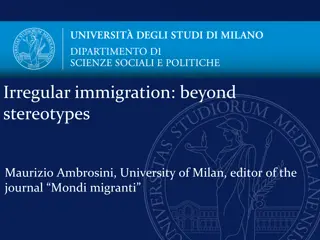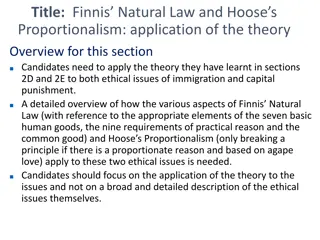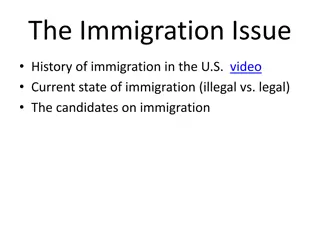Journey of Jewish Immigration to America: Making Difficult Decisions
Explore the challenges faced by Jewish immigrants in early 20th-century America through interactive scenarios. Navigate between tradition and progress, family values, and financial decisions. Immerse yourself in a simulation where choices impact the future. Experience the balance between cultural heritage and adapting to a new life.
Download Presentation

Please find below an Image/Link to download the presentation.
The content on the website is provided AS IS for your information and personal use only. It may not be sold, licensed, or shared on other websites without obtaining consent from the author. Download presentation by click this link. If you encounter any issues during the download, it is possible that the publisher has removed the file from their server.
E N D
Presentation Transcript
After Ellis Island Please take a seat at a table, and get ready to have some fun!
Goals 1. To learn about Jewish History and Jewish Immigration to the United States 2. Create a personal connection to the American Jewish story 3. Understanding the struggle between tradition and progress 4. To continue to work on the importance of working together as a team 5. To have fun
Now that Were in America, What Do We Do? Mazal Tov on coming to America! While there is a rich history of Jewish migration to the United States, both before the opening of Ellis Island and after its closure, we will focus tonight on the transition into American life of those Jews who immigrated to the United States in the early 20th century. Now that your family has made it, you will have to make difficult decisions in your new home. Every decision carries with it potential reward, and potential cost. The choices you make will impact your family long into the future.
Now that were in America, what do we do? Each Family will receive the following items: 1. $100 Simulation Cash 2. 15 Blue Traditions Tokens 3. 15 Red Family Tokens You have begun your new life in America and have these resources for your survival. If the family runs down to zero cash they are evicted from their home and go hungry. Tradition tokens represent the family s dedication to Jewish tradition. Family tokens represent the closeness of your family.
Scenario 1 Your family runs a small shoe-repair shop. Here in America, most stores stay open on Saturday, something you never saw in your home country. Do you keep the store open on Saturday and earn more money, or do you think your family should observe Shabbat?
Results for Scenario 1 Keep Store Open: (Gain $40, but lose 2 Tradition Tokens and 1 Family Token) Sometimes you have to make these sacrifices in order to compete in the American business world. Gain $40 in additional sales, but lose 2 tradition tokens as your children become less and less interested in honoring Shabbat. Also, by working on Shabbat, you give up one of the best chances your family has to spend time together at home. Lose 1 family token too. Close the store for Shabbat: (Gain 3 Tradition Tokens, and 2 Family Tokens, but lose $40) You lose $40 because your competitors are winning away your weekend business. However, you are upholding a long standing Jewish tradition and gain 3 tradition tokens for you dedication and 2 family tokens for spending your time w/your family.
Scenario 2 One of your children is complaining that his classmates are making fun of him because he has to go to synagogue services every Shabbat. He would rather join the school baseball team, which practices on Saturday. You know that if he joined the team, he would be happier and would make new friends. Do you continue to force him to go?
Results for Scenario 2 Make him go to Temple: (Gain 2 Tradition Tokens, and Lose 1 Family Token) Your son gets angry with you for not letting him spend time with his friends from school. Even though it causes this tension in your family, you get 2 tradition tokens for upholding this important value. Let him skip services: (Gain 1 Family Token, and Lose 2 Tradition Tokens) You lose 2 tradition tokens as your children become less and less interested in attending religious services. Eventually, it seems that they may stop going to the synagogue altogether, a thought which breaks your heart. However, your son becomes a valuable shortstop on the baseball team, and his happiness winds you 1 family token.
Scenario 3 You have just heard that two of your elderly relatives are immigrating to the United States. You have never been very close to them, but you know that they know no one in America and have no places to stay. Do you offer to let them stay with you, knowing that there is barely enough money to support your family as it is? Do you not let them stay with you?
Result for Scenario 3 Invite them to stay with you: (Lose $30, and Gain 4 Family Tokens) Everything seems to cost more now that there are two new people under your roof, and there is barely enough room to turn around in your tiny apartment sometimes. However, you have fulfilled an important mitzvah by helping out your relatives. Don t let them stay with you: (Lose 3 Family Tokens) Your family is obviously not as important to you as it used to be. You probably could have lived without a few extra dollars it would have cost to give your relatives a place to stay. But, by forcing your relatives to look elsewhere for a place to live, you may have shown your children a bad example of the importance of Jewish family.
Scenario 4 In the old country, you used to only speak Yiddish or Ladino at home. But now your children only speak English with their friends at school and tell you that speaking Yiddish/Ladino embarrasses them. They want to become as American as possible and don t even want to remain bilingual. Do you continue to speak Yiddish/Ladino at home or forget the old language and learn English instead?
Results for Scenario 4 Continue speaking Yiddish/Ladino: (Gain 2 Tradition Tokens, but Lose $20 and 1 Family Token) Your kids are very angry with your old- fashioned ways and their frustration make you lose 1 family token. However, Yiddish/Ladino is a language of your people and you gain 2 tradition token for you dedication to the traditional ways of your ancestry. You are less employable because you do not speak English well. Speak English only: (Gain $20, but Lose 3 Tradition Tokens and 1 Family Token) Your children are grateful about your decision, and you do begin to feel like true Americans as your English skills improve. You soon realize, however, that you have forgotten almost all of your old language, and that you are contributing to the rapid loss of Yiddish culture in America. You lose 1 family token as your ability to communicate with your elderly relatives diminishes. You also lose 3 tradition tokens, but you don t worry about it too much, because most of your neighbors are making the same decision and you re confident that speaking English will be better for your children in the long run. You are more employable because you speak English well.
Scenario 5 One of your children sells fabric in the garment district. He has the opportunity to sign a big contract and sell a large amount of cloth to a very rich client. However, the client is a Catholic immigrant from Sicily, insists on having a meeting on the evening of Rosh Hashanah, when your whole family is supposed to be at Synagogue. What should he do?
Results for Scenario 5 Go to the meeting: (Gain $60, but Lose 2 Family Tokens and 3 Tradition Tokens) The meeting is a success! Your son has sold a huge amount of cloth and your family earns $60 in the process! However, the fact that he was not present at Rosh Hashanah services causes a large fight in your family and you lose 2 family tokens. Also, since this the first year your whole family hasn t been in synagogue for Rosh Hashanah, you also lose 3 tradition tokens. Go to services: (Gain 2 Family Tokens and 2 Tradition Tokens, but Lose $30) That meeting would have really helped your family s bank account. Your son loses the account, and his boss is disappointed in him. He loses his job, costing your family $30. However, your family stays close-knit because of your dedication to Judaism, and your children learn the importance of upholding and celebrating Jewish Holidays. You earn 2 tradition tokens and 2 family tokens.
Scenario 6 One of your daughters falls in love with a man named Tommy, an Irish immigrant who is not Jewish. He asks you for permission to marry her. This would be the first interfaith marriage in your family and the older relatives are shocked. However, the marriage would make your daughter very happy, and Tommy is a quite wealthy, so the wedding might ensure a more secure future for the family. Do you allow your daughter to marry Tommy, or do you forbid her to marry Tommy?
Results for Scenario 6 Let her marry him: (Gain $25, but Lose 2 Tradition Tokens and 4 Family Tokens) The wedding goes ahead as planned, but none of the older relatives will attend the service, calling is a shonde, a disgrace. As he promised, Tommy sends you some money, but your daughter informs you that they have decided to raise their children as Christians. Tommy gives you a $25 gift, but the intermarriage loses you 2 tradition tokens and 4 family tokens. Don t let her marry him: (Gain 3 Tradition Tokens, but Lose $25 and 1 Family Token) The money you would have earned from the wedding would have been helpful, and unfortunately Tommy s well-connected family has convinced fellow Irish Immigrants not to do business with you. Gain 3 tradition tokens for upholding your principles, but you lose 1 family token it will be a long time before your daughter forgives you for your actions.
Scenario 7 A new immigrant from Poland has moved in to the tenement next door in your neighborhood. His name is Mendel, and he is a kosher butcher. Finally, your family has access to kosher meats! You always used to keep kosher in the old country, and now it is convenient for you to do it in America! However, the price of the kosher meats is much more than non-kosher meats, and there are some rumors going around that Mendel s shop might not be 100% kosher- you overheard someone claiming to have bought pork chops from him! Do you decide to start keeping kosher or not keep kosher?
Results for Scenario 7 Start keeping kosher: (Gain 2 Tradition Tokens and 2 Family Tokens, but Lose $15) You had no idea this would be so expensive! Mendel s meats cost nearly twice as much as the meat you were used to eating. However, it feels good to be continuing the old Jewish tradition. Also, because your children eat only kosher food now, the family eats most meals together during the week something your family never had time to do before. Gain 2 tradition tokens and 2 family tokens, but lose $15 for the cost of the meat. Don t keep kosher: (Gain $10, but Lose 2 Tradition Tokens and 2 Family Tokens) You couldn t really afford in anyway. The money you save on food earns you $10 but you wish you could have observed the laws of kashrut, which used to be very important to you while you were growing up. Also since your family can eat any food they want, your kids never eat meals at home they prefer to get their food from the vendors on the street. Lose 2 tradition tokens and 2 family tokens
Scenario 8 Final Scenario The Jewish National Fund has come to your neighborhood looking for donations. It is a very good cause - the JNF helps develop land in Israel, the Jewish homeland. But, money is very tight these days. Do you donate, or do you not donate?
Results for Scenario 8 Yes, we donate: (Gain 1 Tradition Token, but Lose $15) You contribute $15, a big part of your monthly budget. You re not sure if you ll be able to pay your rent if more money doesn t come in soon. However, your dedication to the mitzvah of Tzedakah is gains you 1 tradition token. No, we don t: (Lose 2 Tradition Tokens) You keep your hard-earned money, but you have shown your children that upholding the Jewish mitzvah of Tzedakah is not that important to you. Lose 2 tradition tokens.
Money $0: Your family, having run out of money, has been evicted from your apartment. Your children are starving and there is little hope for your survival in the future. $5-$80: Your family barely survived the tenements of the lower east side. Your children grew up hungry, and never managed to have all the things they wanted tor needed. However, everyone survived, and everyone grew up appreciating the values and importance of money. After several generations, your family moved to a lower middle class suburb of Chicago, where they are still living today. $85- $160: Your family did relatively well during their stay in New York during the early 20th century. You managed to survive the Great Depression and made enough money by 1950 to move to a middle class neighborhood near Boston. Your children all found well-paying jobs, and your grandchildren have all the things they need- excellent medical care, food, and a good education. $165+: Your family has made a lot of money! No one could ever expect that a family who lived in such poverty during the Great Depression would manage to become so successful. You were very successful during the first half of the 20th century and you moved to a large house in California in the late 1950 s. Your children are all very wealthy, but you have some fears that your grandchildren are growing up spoiled. All in all, your family has all the things they need and are generally very happy.
Family 0-6: Your family began falling apart almost as soon as you settled in New York. You never thought you would experience the things that have happened to you. Almost all of your children and grandchildren have been married and re-married several times. Many family members have had long standing arguments which means that they don t speak to each other any more. Family events - weddings, birthdays, holidays - are no longer happy occasions. 7-13: Your family has done relatively well staying close. Of course, you have had several of the problems that normal American families experience. Despite occasional arguments, you love your family very much and are content to see them every year or so when you get together for holidays. 14+: You should be very proud of yourself! Your family has remained very close ever since you came to America. Your children and grandchildren have all succeeded in keeping their homes full of happiness and love. As you grow old, your greatest joy still comes from weddings, birthdays, and holidays, when your whole family comes together from all over the world to celebrate.
Tradition 0: Because you have no Tradition tokens left, your family is no longer Jewish. Some of your children and grandchildren actually converted to other religions; others simply stopped caring about Judaism. Sometimes you wish that they hadn t sacrificed their religion in order to become more American. 1-10: Your ancestors would be shocked to see how much of your Jewish heritage you have lost. None of your children have gone to religious school or had a bar or bat mitzvah. No one in the family understands Hebrew or Yiddish. At least a few of your relatives still go to synagogue on Yom Kippur and Rosh Hashanah, and a few others insist on having Jewish weddings when they get married. You are very worried about the family, and wonder if there will be any Jewish family members at all after one or two more generations.
Tradition 11-20: It has been hard for your family to remain Jewish is America. Almost all of the family goes to synagogue a dew times a year, and the grandchildren are having Bar and Bat mitzvah and confirmation services regularly. A few of your cousins still keep kosher and observe Shabbat, and one of your sons serves on the Board of Directors for your Temple. You are very proud when your grandchildren tell you about their youth group experiences, and you still give Tzedakah regularly to Jewish charities. You are confident that your family will still remain faithfully Jewish into the 21stcentury. 21+: Even though American life has not always been easy because of your religious devotion, you have managed to maintain your tradition even through the difficult times. Your family is still strongly dedicated to its Judaism. Your daughter grew up to help found the local branch of the Jewish Federation. One of your granddaughters becomes a Rabbi, and a grandson makes Aliya to Israel. Jewish holidays and life-cycle events are an exciting, happy time for your family, and most of your relatives have managed to stay observant. Although the times were tough as a new immigrant, you are proud of your devotion to Judaism, and you are pleased that your family will remain Jewish for many generations.























